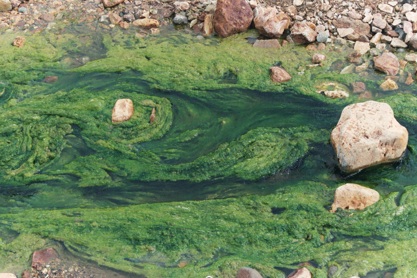Key words :
future energies,
water
,global warming
,biofuel
,future energies
,biodiesel
,united states
,crop plants
,algae
On Algal Biodiesel
29 Jan, 2008 05:11 pm
Eons ago, microalgae (tiny plants) growing in primeval oceans died and formed a layer on the sea bed. Over geological time, i.e., millions of years, the algae were buried and gave rise to what we now know as crude oil. Today our goal is to utilize algal oil directly, bypass geological time and fix some atmospheric carbon dioxide that is contributing to global warming!
Thus, the acreage required to sustain the oil appetite of, say, the United States, is enormous. It is estimated that the entire continent of Europe would be need to be planted with rape in order to satisfy just this demand. The relative inefficiency of the process to produce biodiesel from plant crops allows oil from microalgae to compete with higher plants as a feed stock to the industry.
The percentage of oil in a microalga may reach a level as high as 80% of its dry weight, but an average figure would be nearer 40%. No higher plant makes that much oil. What this means in practical terms is that the footprint of a facility to produce algal oil is very much smaller that that for needed for a process based on traditional agriculture. The algal advantage over crop plants in this regard may be as high a several hundred times.

There is another critical advantage that algae have over crop plants. Plants need water that is close to potable in quality and certainly not water that is saline. On the other hand algae actually require water that is saline, making desert areas prime areas for algal biodiesel plants. Even so, we cannot use algal oil directly, even if we could produce it in sufficient quantity. Oil has to be extracted from the algal biomass and converted chemically to a product with a composition close to that of petroleum crude–based diesel fuel.
There are still other problems besetting this new industry. Aspects of the production process now being considered are the best algal species to use, how they will be grown economically and reproducibly on a massive scale, what method will be used to harvest the cells of algae and how the oil will be extracted from the biomass. There is talk about the use of genetically engineered organisms to improve oil yields, but that will approach will have to wait until we a have a firm idea about the biochemical pathways of oil synthesis and utilization in selected strains of production algae.
About twenty years ago, the Solar Energy Research Institute of the U.S. Department of Energy ( now the National Renewable Energy Laboratory) ran the Aquatic Species Program- an effort to learn the basic requirements for a commercial algal-based biodiesel effort. Most of the contractors in this program were in universities and carried out mostly basic research. The extramural program ended in the nineties but not before some of its major goals were achieved.
Our laboratory helped in this regard. We developed a micro-method to determine the relative oil content of algal cultures which greatly facilitated the screening process for high oil producing organisms, since about one thousandth of the sample size was needed to make a determination. Another contribution from our laboratory concerned how the yield of oil from an algal cell could be controlled by external conditions. We also pointed out that oil accumulation was a balance between oil synthesis and oil utilization by the algal cell. This concept was not originally considered by the program which sought to find a physiological “trigger “for oil synthesis.
All this research came to an end in the late nineties when the extramural program at the Department of Energy was terminated. Who knows just where we would be today if this research had been allowed to continue. Nevertheless, the market for biodiesel is here to stay but the algal component still needs some more research. Several U.S. federal funding agencies are close to supporting research programs the goals of which are to achieve energy independence for the country in the not too distant future.
Key words :
future energies,
water
,global warming
,biofuel
,future energies
,biodiesel
,united states
,crop plants
,algae
-
12/12/12
“Peak Oil” is Nonsense… Because There’s Enough Gas to Last 250 Years.
-
05/09/12
Threat of Population Surge to "10 Billion" Espoused in London Theatre.
-
05/09/12
Current Commentary: Energy from Nuclear Fusion – Realities, Prospects and Fantasies?
-
04/05/12
The Oil Industry's Deceitful Promise of American Energy Independence
-
10:00
Shaky Foundations for Offshore Wind Farms






